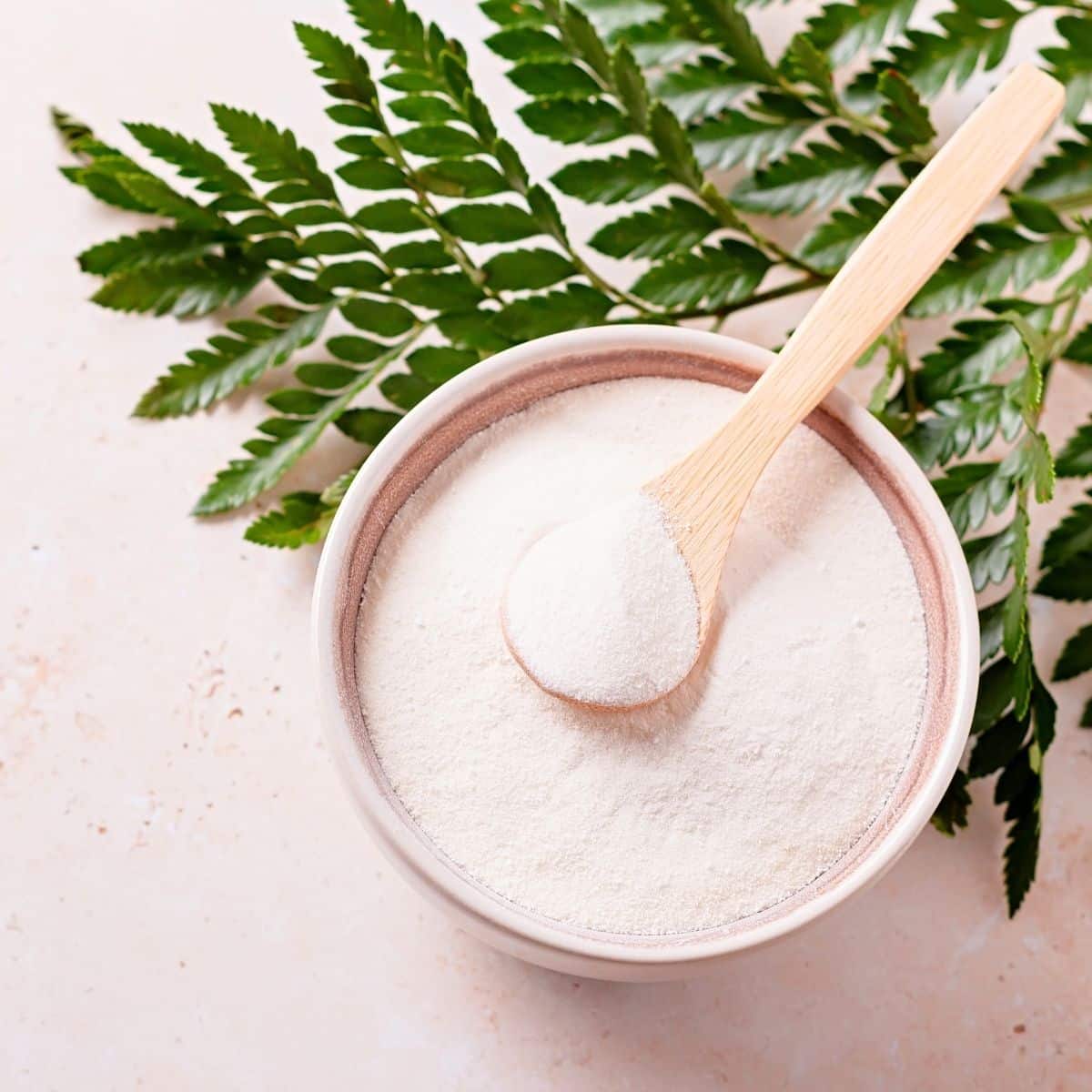Inflammation and gut health have become a hot topic lately. Is leaky gut the source of your gut inflammation and digestive problems? Can you reduce inflammation in the gut and improve intestinal permeability, otherwise called leaky gut? What are the signs of gut inflammation, and how can you heal an inflamed gut? What causes gut inflammation? These are common questions I receive daily. So, let’s dive into this topic on how to reduce gut inflammation.

Jump To:
💚 Reduce Inflammation With Nutrition Tips To Help With Leaky Gut Symptoms
Harvard Health calls it a “medical mystery” and “mysterious ailment.” It’s been linked to everything from gut troubles, autoimmune diseases, and even mental health concerns.
I’m talking about “leaky gut” or “intestinal permeability”—have you heard of it?
❤️ Leaky Gut, Gut Health, And Inflammation!
What exactly is “leaky gut?”
Do you have it? How does it happen? What can you do about it? Is leaky gut messing with your gut health and connected with gut inflammation?
So many questions.
Many doctors and the established medical community may not recognize it, but there is growing research to suggest it is associated with many health conditions.

⁉️ How Leaky Gut Affects Health Conditions?
The most common health conditions with a connection to gut inflammation include gastrointestinal disorders, allergies, autoimmune disease, arthritis, depression and anxiety, neurodegenerative disease, skin conditions, neurodevelopmental disorders, and metabolic syndrome (type 2 diabetes, high blood pressure, and obesity).
Gastrointestinal Tract And The Gut Barrier
Your gut (gastrointestinal system) is not just a 30-foot-long muscular tube (tract) that starts at your mouth and ends with you going to the bathroom.
It’s, in fact, It’s a vast and complex system with many functions. It breaks down food into smaller digestible bits, keeps it moving through the gastrointestinal tract, and skillfully absorbs water and nutrients while keeping out harmful substances.
More and more research shows that these essential gut functions are interconnected throughout your body—to everything from your heart to your brain.
Digestive System
Your gastrointestinal tract is lined with millions of cells, all side-by-side in a single layer. In fact, this layer, if spread out flat, covers 400m2 of surface area!
Those intestinal cells help the body absorb what we need from foods and drinks, while keeping out what needs to stay out. It acts as a gatekeeper, allowing in what your body uses, and keeping out the rest, which ends up as waste.
This ability to selectively allow some things in our gut to be absorbed while keeping others out is only possible if the cells are working properly and physically together tightly.
The bonds that keep the cells tightly together are called “tight junctions.”
⁉️ What Does Leaky Gut Mean?
What causes leaky gut to occur?
Leaky gut happens when the tight junctions aren’t so tight anymore. The cellular barrier is irritated and weakened, allowing tiny holes to appear.
These perforations allow things that normally would stay out of the bloodstream to get into the bloodstream. Things like food particles, waste products, and bacteria.
When these get into the bloodstream, your immune system is triggered to start fighting them.
Similarly to how your immune system starts fighting the cold virus and causes inflammation. This immune reaction is normal and helps keep you healthy.

🤔 Signs And Symptoms Of Leaky Gut Syndrome
The symptoms of leaky gut are similar to other digestive conditions like inflammatory bowel disease, celiac disease, and Crohn’s disease.
So, what are the 6 classic signs of leaky gut?
Leaky gut symptoms can include diarrhea, constipation, cramps, bloating, food sensitivities, or nutrient deficiencies.
But, because the food particles, toxins, and bacteria have been absorbed into the bloodstream, which travels throughout your body, symptoms can appear anywhere.
Studies show leaky gut may feel like fatigue, headaches, confusion, difficulty concentrating, joint pain, or skin problems (e.g., acne, rashes, eczema).
Leaky gut is also linked with diabetes, polycystic ovarian syndrome, liver disease, chronic fatigue syndrome, and autoimmune diseases such as lupus and multiple sclerosis. There may even be links to anxiety and depression.
🧪 Need A Leaky Gut Test?
Many of these gut and non-gut symptoms and conditions are linked to chronic inflammation, but more research is needed to understand how they are connected.
Even if you have some of these symptoms, the fact is, it’s very difficult to diagnose a leaky gut, nor how leaky it is. This means that while there are some biomarker tests, there isn’t yet a reliable diagnostic test available.
So, it’s difficult to say whether your symptoms are from leaky gut, or whether leaky gut is a symptom of another issue.
⁉️ What Causes Leaky Gut (Intestinal Permeability) And Inflammation To Happen?
It’s not 100 percent clear what causes those bonds to loosen and result in tiny perforations in the gut barrier.
In fact, we’re just starting to understand how the gut barrier functions, and there is a lot of ongoing research.
Part of leaky gut may be due to the genes you inherit from your parents. It can also be from medications or gut infections.
Leaky gut is also linked to eating a diet low in gut-friendly fiber (adults should aim for 25-30 g of fiber per day). It can also be from consuming too much added sugar and saturated fat.
Leaky gut may even result from stress or an imbalance in the diversity and numbers of your friendly gut microbes.
Also, as you age, your cells can get damaged more easily and heal slowly, including the cells that line your gut. This can leave you more susceptible to loosening the gut barrier.
❤️🔥 Inflammatory Bowel Disease (IBD) Versus Irritable Bowel Syndrome (IBS)
Irritable bowel syndrome (IBS) is a disorder or syndrome that describes symptoms of bowel function disturbances.
Irritable bowel syndrome does NOT cause inflammation, but that stress is a major contributor to the cause of IBS. There are typically bowel motility problems. The nerve endings lining the bowel become irritated and trigger either a delay or emptying of bowel movements.
Think constipation or diarrhea.
An individual can fluctuate between periods of constipation or episodes of diarrhea.
Inflammatory Bowel Disease
What is inflammatory bowel disease?
Inflammatory bowel disease (IBD) is a group of conditions that cause the intestines to become inflamed. The two main types are ulcerative colitis and Crohn’s disease.
The intestines are long, hollow tubes that connect the stomach to the anus.
In IBD, inflammation causes sores or ulcers on the lining of your intestines, and can also affect the joints, eyes and skin.
⁉️ What Causes Inflammatory Bowel Disease?
Is IBD an autoimmune disease? The disease itself doesn’t create antibodies, so technically speaking is not considered an “autoimmune disease”.
However, new researchers are pushing the latest term, “auto inflammatory condition”. IBD is not contagious (you cannot catch it from someone else).
Causes of gut inflammation in relation to inflammatory bowel disease are thought to be caused by a combination of your genes, your immune system and environmental factors.
⁉️ What Are The Symptoms Of Inflammatory Bowel Disease?
The symptoms of IBD can vary from person to person.
📥 GET THIS ARTICLE IN YOUR INBOX 📥
Symptoms include: abdominal pain, diarrhea, bleeding from the rectum, fever and weight loss.
The most common type of IBD is ulcerative colitis, which affects only the large intestine (colon).
The inflammation usually starts in the rectum and lower part of the colon, but it can spread to other parts of the colon.

Crohn’s Disease
The second most common type is Crohn’s disease. It usually affects any part of the digestive tract, from the mouth to the anus.
Symptoms can include: abdominal pain, diarrhea, and rectal bleeding.
Crohn’s disease can also affect other parts of your body, such as your joints and skin.
About 1 million people in the United States have IBD, but the disease is most common in Europe and North America. It affects men and women equally, but usually starts between 15 and 30.
Let’s circle back to discussing the causes of gut inflammation while it relates to Crohn’s disease.
A reaction causes Crohn’s disease to your own intestinal bacteria. Normally, these bacteria help protect you from harmful germs that get into your intestines. But in people with Crohn’s disease, the immune system attacks these bacteria because it mistakenly believes they are harmful invaders.
This causes inflammation and damage to your intestines.
The exact cause of Crohn’s disease is unknown, but it may be caused by a combination of things. It tends to run in families and seems related to abnormal immune responses.
Factors That Play A Role In Crohn’s Disease
Other factors that might play a role in causing Crohn’s disease include:
- A reaction to certain foods, such as milk and wheat.
- Certain infections or viruses.
- An overactive immune system. A problem with how your immune system works is present in most people with Crohn’s disease.
- An abnormal response to stress and anxiety.
Treatment Options For Crohn’s Disease
Are there any treatment options for Crohn’s disease? Treatment for Crohn’s disease depends on how severe the symptoms are.
So, treatments may include:
- Medications to control symptoms and slow or stop the disease from getting worse. These medications can help with pain, diarrhea, and inflammation of your intestines.
- Medicines to help you absorb nutrients and keep your weight stable.
- Surgery to remove the diseased part of your intestine if medicines do not relieve symptoms or complications, such as an abscess or fistula.

🥗 Diet And Lifestyle Factors That Can Cause Leaky Gut
- Gluten Allergy (Celiac Disease) or Food Sensitivity
- Stress
- Environmental Toxins
- Antibiotic Use for Infections
- Use of Seed Oils
- Sleep Disorders
- Cesarean Birth and Use of Baby Formula
- Food Additives
⁉️ What Can You Do To Help Heal Leaky Gut?
We talked about what causes gut inflammation. But, what can you do to reduce leaky gut?
First, always address the main root causes of leaky gut. Then follow through with the healing process of leaky gut.
One way to approach a suspected leaky gut is to address inflammation and eat a more gut-friendly diet.
Eat a Nutrient-Dense, Unprocessed Diet
One of the first steps in healing gut inflammation is diet. This means reducing excessive alcohol and processed foods that tend to be high in fat and sugar or artificial sweeteners. It’s also a good idea to avoid foods that you’re allergic or sensitive to.
For example, if you have diagnosed celiac disease, you want to stay away from gluten, as exposing your gut to it can cause a large inflammatory response.
Foods To Eat For Leaky Gut And Inflammation (Anti-Inflammatory Foods)
It is important to eat a gut healthier diet when trying to heal gut inflammation associated with leaky gut and other gastrointestinal disorders.
Instead, enjoy more foods rich in gut-friendly probiotics and fiber, which is a prebiotic, or food for your friendly gut microbes.
These include
- Yogurt or Kefir
- Fermented foods (e.g., kimchi, sauerkraut, and miso)
- Fruits and vegetables (e.g., berries, oranges, broccoli, carrots, and zucchini)
- Nuts and seeds (e.g., walnuts, cashews, and chia seeds)
- Whole grains (e.g., oats, corn, and quinoa)
💫 Pro Nutrition Tip
If you’re going to proactively increase your fiber intake, do it over several days or weeks, because sudden increases in fiber can cause gas, bloating, and other gut discomfort.
If you have IBS, talk to your doctor or work with me to see if certain fibers may worsen your condition, and which are recommended.

🩺 Healthy Habits To Support And Heal Leaky Gut
There are healthy habits to improve gut health naturally, reduce and heal inflammation.
- Eat probiotic and prebiotic foods to boost and feed the gut microbiome properly. I recommended Seed Synbiotic, which is both a probiotic and prebiotic.
- Stay active to keep your body healthy. Regular exercise can also help your digestive system. This means taking even a 15- or 20-minute walk after you eat to help you digest your food.
- And don’t forget the importance of stress management, quality sleep, and not smoking. Practice stress management techniques. The management of stress is key to healing the body.
If you plan to make changes to your diet and lifestyle, consider keeping a journal to see if the changes are helping your symptoms.
💭 Final thoughts On Gut Inflammation And Intestinal Permeability (Leaky Gut)
When it comes to leaky gut, a few simple shifts toward a gut-friendly diet can help you address gut inflammation.
🍲 A Leaky Gut Diet Can Help
A leaky gut is associated with gut and non-gut symptoms.
It’s an inflammatory condition linked to metabolic disorders, autoimmune conditions, and even mental health.
There is no good diagnostic test at this time to know if you have it or not.
And remember, this is still a relatively new area of research, so more information emerges all the time.
In the meantime, if you have symptoms that suggest a leaky gut, you can move toward a more gut-friendly diet.
Lifestyle modifications can alleviate inflammation and gut health.
Try cutting down on alcohol, processed foods, and any that you may be allergic or sensitive to. Replace these foods and drinks with ones higher in gut-friendly probiotics and fiber.
And remember that regular exercise, stress management, and quality sleep are great lifestyle strategies for your gut and the rest of your body.
Join Now To Learn How To Heal And Reduce Inflammation In The Gut
If leaky gut or other inflammatory symptoms bother you, book an appointment with me to see if my programs or services can help you.
🗣️ Let’s Discuss Inflammation, Gut Health Causes, And Tips to Reduce!
I would love to hear your experience with leaky gut connection and skin rash. Did you try any lifestyle modifications to help reduce gut inflammation and improve your gut health?
Have you noticed any improvement in your symptoms of leaky gut or inflammation?
You can also connect with me @EatYourNutrition on Instagram. I love seeing your photos. #EatYourNutrition #LauraVillanueva
📚 References
- Cush JJ. Autoinflammatory syndromes. Dermatol Clin. 2013;31(3):471-480. doi:10.1016/j.det.2013.05.001
- Harvard Health. (2018). Putting a stop to leaky gut. Retrieved from https://www.health.harvard.edu/blog/putting-a-stop-to-leaky-gut-2018111815289
- Harvard Health. (2018). Putting a stop to leaky gut: What can you do about this mysterious ailment? Retrieved from https://www.health.harvard.edu/diseases-and-conditions/putting-a-stop-to-leaky-gut
- Leech, B., Schloss, J. & Steel, J. (2019). Association between increased intestinal permeability and disease: A systematic review. Advances in Integrative Medicine. 6(1), 23-34. https://doi.org/10.1016/j.aimed.2018.08.003 https://www.sciencedirect.com/science/article/pii/S221295881730160X
- Mayo Clinic. (2016). Food sensitivities may affect gut barrier function. Retrieved from https://www.mayoclinic.org/medical-professionals/digestive-diseases/news/food-sensitivities-may-affect-gut-barrier-function/mac-20429973
- Medical News Today. (2019). What to know about leaky gut syndrome. Retrieved from https://www.medicalnewstoday.com/articles/326117.php
- Medical News Today. (2019). What is the best diet for leaky gut syndrome? Retrieved from https://www.medicalnewstoday.com/articles/326102.php
- Medscape. (2019). Is ‘Leaky Gut’ the Root of All Ills? Retrieved from https://www.medscape.com/viewarticle/913237
- Mu, Q., Kirby, J., Reilly, C. M., & Luo, X. M. (2017). Leaky Gut As a Danger Signal for Autoimmune Diseases. Frontiers in immunology, 8, 598. doi:10.3389/fimmu.2017.00598 https://www.ncbi.nlm.nih.gov/pmc/articles/PMC5440529/
- National Institutes of Health News in Health. (2017, May). Keeping Your Gut in Check. Retrieved from https://newsinhealth.nih.gov/2017/05/keeping-your-gut-check
- Obrenovich M. (2018). Leaky Gut, Leaky Brain? Microorganisms, 6(4), 107. doi:10.3390/microorganisms6040107 https://www.ncbi.nlm.nih.gov/pmc/articles/PMC6313445/
- US Department of Health and Human Services and US Department of Agriculture. (2015). Dietary Guidelines for Americans 2015-2020, eighth edition. Appendix 7. Nutritional Goals for Age-Sex Groups Based on Dietary Reference Intakes and Dietary Guidelines Recommendations. Retrieved from https://health.gov/dietaryguidelines/2015/guidelines/appendix-7/
Discover more from Eat Your Nutrition™
Subscribe to get the latest posts sent to your email.







